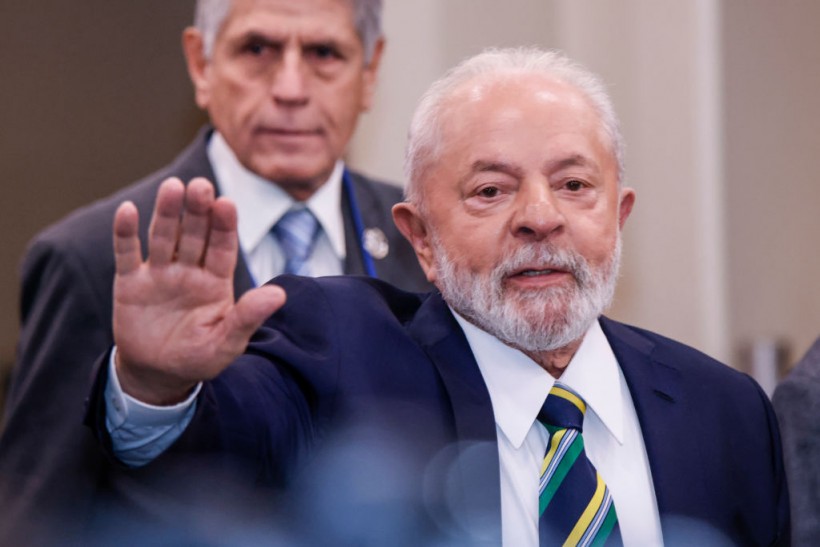Brazil President Lula da Silva To Militarize Key Ports, Airports, International Borders Amid Rising Crime

Brazil's President, Luiz Inácio Lula da Silva, announced the deployment of the armed forces to enhance security at crucial airports, ports, and international borders to combat organized crime in the country, AP reports.
This decision comes in the wake of a series of violent incidents, including the torching of dozens of buses in Rio de Janeiro by a criminal gang, believed to be in retaliation for the police killing the leader's nephew.
At a press conference in Brasilia, President Lula stated, "We have reached a very serious situation," underscoring the need for the federal government to actively participate in addressing organized crime.
The deployment involves mobilizing 3,600 members of the army, navy, and air force to bolster patrols and surveillance at key locations, such as international airports in Rio and Sao Paulo, as well as two maritime ports in Rio and Santos, Latin America's busiest port and a significant export hub for cocaine.
READ NEXT: Brazil Plane Crash Kills 14
Organized Crimes in Brazil
The government's emphasis on ports, airports, and the western frontier underscores the significant cocaine trafficking challenges facing Brazil, according to Reuters.
The country has become a vital launchpad for cocaine shipments to Europe, fueling the growth of local criminal gangs and contributing to broader security concerns in South America.
President Lula's decision to deploy the military marks a change in his approach. In a previous interview, he had expressed reluctance to sign such a decree, stating his desire to avoid armed confrontations in the favelas (slums) with gang members.
The previous administration, led by far-right President Jair Bolsonaro, had succeeded in reducing the number of murders in Brazil from record highs.
However, recent polls suggest that Brazilians have growing concerns about President Lula's ability to maintain law and order, with 32% of respondents expecting a deterioration in security during his term.
Increasing Violence in Brazil
Brazil's Justice Minister, Flávio Dino, has emphasized that the measures announced on Wednesday are part of a comprehensive plan developed since President Lula assumed office in January, per The Hill.
These actions have been the result of months of consultations with various stakeholders, including police forces, local officials, and public security experts.
The recent wave of unrest in Rio de Janeiro began on October 5, with the targeted killing of three doctors at a beachside bar.
The motive behind the attack was a mistaken belief that one of the victims was associated with a militia.
These powerful militias originally emerged in the 1990s and comprised mainly former police officers, firefighters, and military personnel who aimed to combat lawlessness in their communities.
Over time, some of these militias transitioned into drug trafficking activities.
In response to these incidents and the growing challenges related to organized crime, both state and federal governments in Brazil have faced mounting pressure to develop a comprehensive plan to address public security issues, particularly in Rio de Janeiro, a city often depicted as a postcard image of the country.
On October 9, a few days after the doctors' killings, the Rio state government deployed hundreds of police officers to three sprawling, low-income neighborhoods to restore order and combat criminal activities.
The situation escalated further on October 23 when Rio's police killed Matheus da Silva Rezende, also known as Faustão, who was the nephew of a militia leader and a member of the organization.
In response to this action, criminals set fire to at least 35 buses in an act of defiance and violence.
Additionally, on the same Wednesday, federal police in Rio reported the arrest of another militia leader and key militia members in Rio das Pedras and Barra da Tijuca, both located in Rio state.
Along with these arrests, authorities seized luxurious, bullet-resistant vehicles, property, and cash as part of efforts to combat and dismantle organized crime structures.
READ MORE: Brazil: 3 Doctors Dead, 1 Injured After a Suspected Politically Motivated Killings
This article is owned by Latin Post.
Written by: Bert Hoover
WATCH: The Truth Behind Brazil's Murder Rates | Super Users - From VICE
Subscribe to Latin Post!
Sign up for our free newsletter for the Latest coverage!












